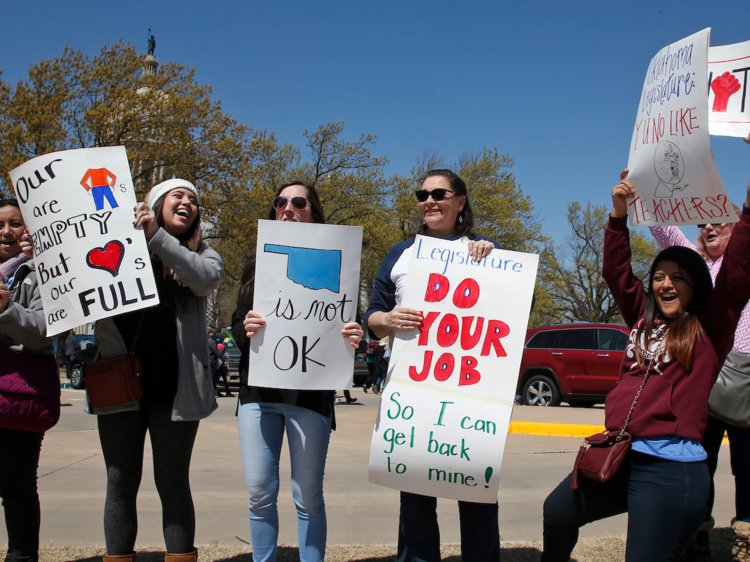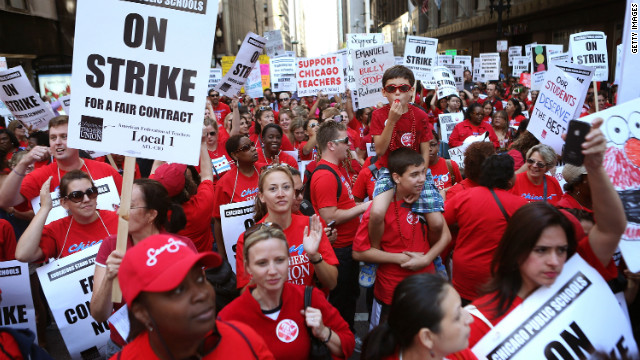By Jamari Saint Cyr
Teacher strikes are an ongoing movement that teachers have been participating in across the country to protest against changes in the pension system for better salary payment and funding. These teacher strikes began in February of this year in West Virginia in response to low salaries and expensive health insurance. From there, inspired teachers in other states to follow suit like Oklahoma, Arizona, and eventually states like North Carolina, Kentucky, and Colorado. 
To try and get a teacher perspective on these ongoing strikes, we reached out to Mr. Cintron who has a very vocal voice when it comes to the topic of teacher strikes and asked him to just give us his general opinion on the strikes overall. What is your general opinion of the Teacher strikes that have been going on? “Public education has been under attack for a long time,” Mr. Cintron said, “and teachers have been on the front end of this attack. There have been such astounding degrees of bias, misinformation, ignorance, and sad undervaluing regarding public education. There is a tremendous disconnect between the forces driving the attack on public education and the actual stakeholders of public education. These strikes have been a long time coming.”
With the line of states seemingly striking one after the other, it makes one wonder if Florida teachers could, too, go on strike. “There has been and there will be some kind of action coming from Florida, but probably not strikes,” answered Mr. Cintron. “As the law reads in Florida if public school teachers strike they will then lose their pensions. Therefore, striking is a last last laaaaaaaast resort kind of action to take. Having said that, the attacks on public schools in Florida include but are not limited to: a controversial, widely unpopular and problematic focus on standardized testing, erosion of academic freedom as teachers are increasingly tied to force-fed curriculum that makes it difficult to impossible for teachers to address the needs of their specific students, a shrinking budget that bleeds public school funds into private schools and charters (that aren’t held to the same daunting standards as public schools), and salaries that are among the lowest in the Nation. The latest attack on teachers is the bill SB7055 that Scott signed into law, that seeks to decertify Teachers’ Unions…only Teachers’ Unions…the only organization that protects teachers AND ultimately students (Teachers’ Unions are leading the defense against the multi-front attacks on public schools that ultimately harm the quality of education public school students receive). Strike or no strike, teachers are leaving the profession in Florida in droves. The situation in Florida will inevitably reach a breaking point.”
And finally with these strikes still currently taking place at this moment, we asked Mr. Cintron what he would predict would be the outcome of these strikes overall and if teachers will actually be able to receive their goals. “I will digress for a moment. The true purpose of the profession of education is woefully misunderstood,” Mr. Cintron explained. “Our society has bought into the misunderstanding that the purpose of education is to prepare students for careers. Not true. The purpose of public education is to perpetuate civilization. In turn, civilization makes careers possible. The purpose of education is to pass on the values, virtues, knowledge, and wisdom that make civilization and democracy flourish. So now to answer your question, it is in everybody’s best interest that teachers’ reach these outcomes. These outcomes aren’t only “theirs”, they’re all of “our” outcomes. Teachers’ working conditions are ultimately ALSO students’ learning conditions.”
Teachers have found their voices, and this is likely far from the last we’ll hear from them as more teachers nationwide could begin to feel inspired by these protests. From the teachers’ perspective, they are not walking out on their students, they are standing up for them.
